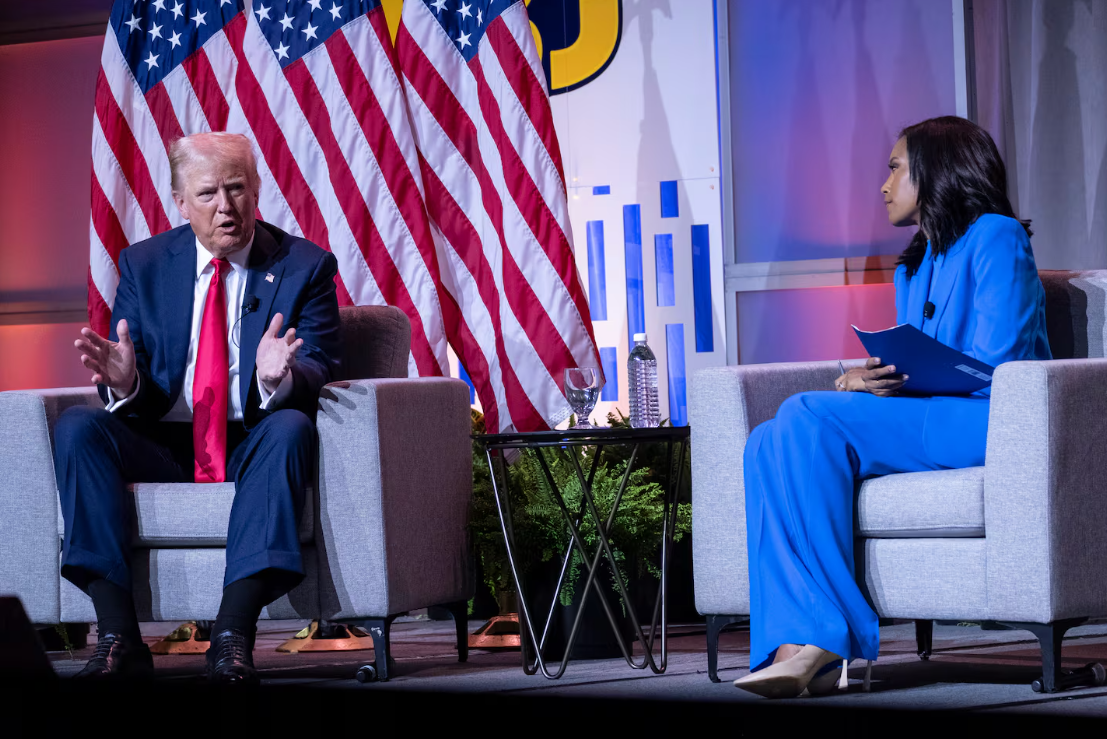特朗普质疑哈里斯的种族身份,称她最近才“变成黑人”

【中美创新时报2024年8月1日编译讯】(记者温友平编译)前总统唐纳德·特朗普周三在一群黑人记者面前质疑副总统卡马拉·哈里斯的黑人身份,暗示他的总统对手利用她的种族形象来获得政治优势。《纽约时报》记者乔纳森·韦斯曼(Jonathan Weisman)和玛雅·金(Maya King)对此作了下述报道。
“她一直都是印度人,然后突然转变成黑人,”特朗普谈到哈里斯时说,哈里斯的母亲是印度裔美国人,父亲是黑人,她一直认为自己是黑人女性。
哈里斯长期以来一直接受她的黑人和南亚裔身份。她就读于历史悠久的黑人大学霍华德大学,并加入了美国第一个为黑人大学女性建立的姐妹会 Alpha Kappa Alpha。她最早的政治胜利可以追溯到 21 世纪初,当时的头条新闻就凸显了她的两种身份。
特朗普的言论在芝加哥全国黑人记者协会的观众中引起了一阵惊呼和嘲笑。这位前总统在那里表现出好斗的一面,这是迄今为止竞选中最不寻常的表现之一,他与记者就多元化努力发生争执,在一系列问题上重复谎言,并告诉大家,他是自亚伯拉罕·林肯以来“对黑人最友好的总统”。
哈里斯周三晚上在休斯顿的一次演讲中谨慎地回应道,他上演了“分裂和不尊重”的“老一套”。
“美国人民应该得到更好的待遇,”哈里斯在美国最著名的黑人姐妹会之一 Sigma Gamma Rho 的一次大会上说道。“美国人民应该得到一位讲真话的领导人,一位在面对事实时不会以敌意和愤怒回应的领导人。我们应该得到一位理解我们的差异不会分裂我们——差异是我们力量的重要源泉——的领导人。”
特朗普在竞选期间主要出现在友好的观众面前,他已经得到充分警告,等待他的记者小组会很棘手。然而,面对三名黑人女性采访者,他侮辱了哈里斯——第一位登上主要政党候选人榜首的黑人女性——尽管他试图吸引黑人选民,称她是 11 月他们的最佳选择。
在采访开始时,他谴责小组中的一名记者、美国广播公司新闻台的雷切尔·斯科特 (Rachel Scott)“卑鄙”和“粗鲁”,因为她质问他过去发表的种族主义言论,包括指责前总统巴拉克·奥巴马不是在美国出生,并将一名黑人检察官描述为“动物”。
他回避了一个关于他承诺赦免 2021 年 1 月 6 日袭击国会大厦的暴徒的问题,称国会大厦上周遭到了亲巴勒斯坦示威者的袭击。那些抗议者确实破坏了建筑物并焚烧了美国国旗,但他们是在华盛顿火车站,而不是国会大厦。
当被问及他曾经说过移民抢走了“黑人的工作”是什么意思时,他说:“黑人的工作就是任何有工作的人。”
但他对哈里斯的评论引人注目。
“我认识她很久了,只是间接认识,没有直接认识,她一直都是印第安人,”特朗普说,他故意把哈里斯的名字念错了。“她只是在宣传印第安人的传统。直到几年前她碰巧变成了黑人,我才知道她是黑人。现在她想被称为黑人。所以我不知道——她是印第安人还是黑人?我尊重两者中的任何一个,但她显然不尊重,因为她一直都是印第安人,然后突然间她转变了,变成了一个黑人。”
活动结束后不久,白宫新闻秘书卡琳娜·让-皮埃尔称特朗普的言论“令人厌恶”且“侮辱”,并补充说“任何人都无权告诉别人他们是谁。”
“她是美国副总统卡马拉·哈里斯。我们必须尊重她的名字,就这样,”让-皮埃尔补充道。
这次半小时的露面发生在民主党人聚集芝加哥正式提名哈里斯和她的竞选搭档为白宫候选人的不到三周前。对特朗普来说,这是一个向黑人选民宣示主权的机会,他一直坚称自己可以吸引黑人选民。
但尚不清楚他是否成功。相反,他用明显的种族歧视的言辞贬低副总统,并拒绝透露她是基于功绩还是基于多样性、公平和包容计划获得职位。
“我真的不知道,可能是,可能是,”他说,然后暗示并非所有成功的黑人女性都是通过这种方式晋升的。他看着福克斯新闻主持人哈里斯·福克纳,后者也是小组成员,在活动期间对特朗普更加关心。“我知道那边的这位女士,哈里斯,是个很棒的人。”
他建议“有人应该调查”哈里斯在种族和民族身份上的转变,这让人想起特朗普最早对奥巴马的种族主义策略,他指责奥巴马出生在美国以外。在那次努力中,他也呼吁对前总统的真实出生地进行“调查”,并暗示奥巴马的出生证明是谎言。
福克纳确实让特朗普松了一口气,提到了通货膨胀和对他生命的暗杀企图。
但斯科特和 Semafor 的政治记者卡迪亚·戈巴对这位前总统施加了巨大压力——要求他承诺给予警察免于起诉,承诺赦免 1 月 6 日袭击国会大厦的暴徒,以及他挑选的副总统候选人、俄亥俄州参议员 JD 万斯过去发表的煽动性言论。
“我登上了这样的舞台,却受到了如此粗鲁的对待,”他一度抱怨道。
当特朗普发表贬损言论并回到他的中心话题时,房间里的记者们一再嘲笑。“我爱这个国家的黑人,”他说。“我为这个国家的黑人做了很多事情。”
周三晚些时候,特朗普自 7 月 13 日集会枪击事件以来首次返回宾夕法尼亚州。在宾夕法尼亚州哈里斯堡的一次活动中,在对哈里斯的攻击之间,他沉思着竞选已经改变,但他没有。“当我被击中时,每个人都认为我会成为一个好人,”特朗普说。他补充道:“我确实同意了大约八个小时。”
共和党总统候选人的出现使全国黑人记者协会产生了分歧,该协会通常欢迎两党的主要候选人。
大会联合主席、华盛顿邮报专栏作家凯伦·阿蒂亚 (Karen Attiah) 因此事辞职,而该协会的著名成员 April Ryan 警告称,特朗普的白宫曾威胁过黑人女性。
“有关当时美国总统袭击黑人女性白宫记者的报道不是神话或猜测,而是事实,”面向黑人美国人的媒体公司 The Grio 的白宫记者 Ryan 在社交媒体帖子中写道。
但该协会的领导人表示,记者不能回避采访主要候选人,台上的女记者向这位前总统施压,并进行了一次揭露真相的采访。
该协会邀请了哈里斯,但该组织的主席肯·莱蒙周三上午表示,她没空。
“我们正在就未来的虚拟选择进行谈判,并且仍在努力达成协议,”他写道。
最令人难忘的交流之一是当特朗普被问及他的竞选搭档万斯是否愿意在必要时接任时。特朗普并不热情洋溢,他说这场竞选实际上是关于选票顶部的。
“从历史上看,副总统在选举方面没有任何影响,”特朗普说,并补充道,“你是在投票给总统。你是在投票给我。如果你喜欢我,我就会赢。如果你不喜欢我,我就不会赢。”
活动结束后,特朗普似乎看到了他所制造的争议中的政治价值。对哈里斯种族身份的攻击一直在右翼圈子和前总统的支持者中蔓延,在这次高调的采访中,他将其推向了主流。
“疯狂的卡玛拉说她是印度人,不是黑人,”他在社交媒体平台上写道。 “她利用每个人,包括她的种族身份。”
本文最初发表于《纽约时报》。
题图:前总统唐纳德·特朗普的言论在芝加哥全国黑人记者协会的观众中引起了惊呼和嘲笑。Joel Angel Juarez/For The Washington Post
附原英文报道:
Trump questions Harris’s racial identity, saying she only ‘became black’ recently
By Jonathan Weisman and Maya King New York Times,Updated August 1, 2024
CHICAGO — Former President Donald Trump questioned Vice President Kamala Harris’ identity as a Black woman Wednesday in front of an audience of Black journalists, suggesting his opponent for the presidency had adopted her racial profile as a way to gain a political advantage.
“She was Indian all the way, and then all of a sudden she made a turn and she became a Black person,” he said of Harris, whose mother was Indian American, whose father is Black and who has always identified as a Black woman.
Harris has long embraced both her Black and South Asian identity. She attended Howard University, a historically Black institution, and pledged Alpha Kappa Alpha, the nation’s first sorority established for Black college women. Headlines from her earliest political victories dating back to the early 2000s highlighted both identities.
Trump’s remarks prompted gasps and jeers from the audience at the National Association of Black Journalists in Chicago. The former president’s combative appearance there was one of the most unusual of the campaign so far as he sparred with reporters over diversity efforts, repeated falsehoods about a range of subjects and told the group that he was “the best president for the Black population” since Abraham Lincoln.
Harris responded in careful fashion Wednesday night, saying in a speech in Houston that he had put on the “same old show” of “divisiveness and disrespect.”
“The American people deserve better,” Harris said at a convention of Sigma Gamma Rho, one of the nation’s most prominent Black sororities. “The American people deserve a leader who tells the truth, a leader who does not respond with hostility and anger when confronted with the facts. We deserve a leader who understands that our differences do not divide us — they are an essential source of our strength.”
Trump, who has appeared mainly before friendly audiences while campaigning, had ample warning that the panel of journalists awaiting him would be tough. Yet facing three Black female interviewers, he insulted Harris — the first Black woman on the top of a major-party ticket — even as he tried to appeal to Black voters as their best choice in November.
He began the interview by denouncing one of the reporters on the panel, Rachel Scott of ABC News, as “nasty” and “rude” after she questioned him about racist statements he had made in the past, including accusing former President Barack Obama of not being born in the United States and describing a Black prosecutor as an “animal.”
He deflected a question about his promise to pardon the rioters who attacked the Capitol on Jan. 6, 2021, by saying the Capitol was attacked last week by pro-Palestinian demonstrators. Those protesters did deface buildings and burn an American flag, but they were at a Washington train station, not the Capitol.
Asked what he meant when he once said immigrants were taking “Black jobs,” he said: “A Black job is anybody who has a job.”
But his comments on Harris stood out.
“I’ve known her a long time indirectly, not directly very much, and she was always of Indian heritage,” said Trump, who makes a point of mispronouncing Harris’ name. “And she was only promoting Indian heritage. I didn’t know she was Black until a number of years ago when she happened to turn Black. Now she wants to be known as Black. So I don’t know — is she Indian or is she Black? I respect either one but she obviously doesn’t because she was Indian all the way, and then all of a sudden she made a turn and she became a Black person.”
Shortly after the event, White House press secretary Karine Jean-Pierre called Trump’s remarks “repulsive” and “insulting,” adding that “no one has any right to tell someone who they are.”
“She is the vice president of the United States, Kamala Harris. We have to put some respect on her name, period,” Jean-Pierre added.
The half-hour appearance came less than three weeks before Democrats converge on Chicago to formally nominate Harris and her running mate as the party’s candidates for the White House. For Trump, it was an opportunity to stake his claim to Black voters that he has insisted he can attract.
But it was not clear he succeeded. Instead, he disparaged the vice president in clearly racial terms and declined to say whether she had achieved her position based on merit or based on diversity, equity and inclusion programs.
“I really don’t know, could be, could be,” he said before suggesting that not all successful Black women were promoted by such means. He looked at Harris Faulkner, the Fox News host who was also on the panel, who was more solicitous to Trump during the event. “I know this lady right over there, Harris, is a fantastic person.”
His suggestion that “somebody should look into” Harris’ shift in ethnic and racial identity was reminiscent of Trump’s earliest racist gambit against Obama, whom he accused of being born outside the United States. In that effort, too, he called for “investigations” into the former president’s true birthplace and suggested Obama’s birth certificate was a lie.
Faulkner did offer Trump some relief, bringing up inflation and the assassination attempt on his life.
But Scott and Kadia Goba, a politics reporter at Semafor, pressed the former president hard — on his promise to give police officers immunity from prosecution, his promise to pardon the rioters who attacked the Capitol on Jan. 6, and the inflammatory statements made in the past by his vice-presidential pick, Sen. JD Vance of Ohio.
“I came onto a stage like this and I got treated so rudely,” he complained at one point.
Reporters in the room repeatedly scoffed as Trump made disparaging remarks and returned to his central theme. “I love the Black population of this country,” he said. “I’ve done so much for the Black population of this country.”
Later Wednesday, Trump returned to Pennsylvania for the first time since the shooting at his July 13 rally. In between his attacks on Harris, at an event in Harrisburg, Pennsylvania, he mused that the race had changed, but he had not. “When I got hit, everybody thought I was going to be a nice guy,” Trump said. He added: “I really agreed with that for about eight hours or so.”
The appearance of the Republican presidential nominee had divided the National Association of Black Journalists, which typically welcomes the leading candidates from both parties.
A co-chair of the convention, Washington Post columnist Karen Attiah, stepped down from her post over it, while a prominent member of the association, April Ryan, warned that Trump’s White House had threatened Black women.
“The reports of attacks on Black women White House correspondents by the then-president of the United States are not myth or conjecture, but fact,” Ryan, the White House correspondent for The Grio, a media company geared toward Black Americans, wrote in a social media post.
But leaders of the association said journalists could not shy from interviewing major candidates, and the women on the stage pressed the former president and delivered a revealing interview.
The association invited Harris but the group’s president, Ken Lemon, said Wednesday morning that she was not available.
“We are in talks about virtual options in the future and are still working to reach an agreement,” he wrote.
Among the more memorable exchanges was when Trump was asked whether his running mate, Vance, would be prepared to take over if necessary. Trump was less than effusive, saying the race was really about the top of the ticket.
“Historically, the vice president, in terms of the election, does not have any impact,” Trump said, adding, “You’re voting for the president. You’re voting for me. If you like me, I’m going to win. If you don’t like me, I’m not going to win.”
After the event, Trump seemed to see political value in the controversy he had created. The attack on Harris’ racial identity has been percolating in right-wing circles and among the former president’s supporters, and in the high-profile interview, he thrust it into the mainstream.
“Crazy Kamala is saying she’s Indian, not Black,” he wrote on his social media platform. “She uses everybody, including her racial identity.”
This article originally appeared in The New York Times.

